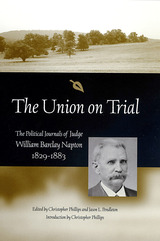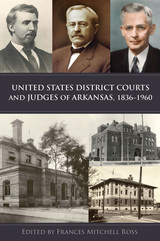105 books about Judges and 2
start with U
105 books about Judges and 2
105 books about Judges
2 start with U start with U
2 start with U start with U

The Union on Trial
The Political Journals of Judge William Barclay Napton, 1829-1883
Edited by Christopher Phillips & Jason L. Pendleton. Introduction by Christopher Phillips
University of Missouri Press, 2005
Spanning some fifty-four years, The Union on Trial is a fascinating look at the journals that William Barclay Napton (1808–1883), an editor, Missouri lawyer, and state supreme court judge, kept from his time as a student at Princeton to his death in Missouri. Although a northerner by birth, Napton, the owner or trustee of forty-six slaves, viewed American society through a decidedly proslavery lens.
Focusing on events between the 1850s and 1870s, especially those associated with the Civil War and Reconstruction, The Union on Trial contains Napton’s political reflections, offering thoughtful and important perspectives of an educated northern-cum-southern rightist on the key issues that turned Missouri toward the South during the Civil War era. Although Napton’s journals offer provocative insights into the process of southernization on the border, their real value lies in their author’s often penetrating analysis of the political, legal, and constitutional revolution that the Civil War generated. Yet the most obvious theme that emerges from Napton’s journals is the centrality of slavery in Missourians’ measure of themselves and the nation and, ultimately, in how border states constructed their southernness out of the tumultuous events of the era.
Napton’s impressions of the constitutional crises surrounding the Civil War and Reconstruction offer essential arguments with which to consider the magnitude of the nation’s most transforming conflict. The book also provides a revealing look at the often intensely political nature of jurists in nineteenth-century America. A lengthy introduction contextualizes Napton’s life and beliefs, assessing his transition from northerner to southerner largely as a product of his political transformation to a proslavery, states’ rights Democrat but also as a result of his marriage into a slaveholding family. Napton’s tragic Civil War experience was a watershed in his southern evolution, a process that mirrored his state’s transformation and one that, by way of memory and politics, ultimately defined both.
Students and scholars of American history, Missouri history, and the Civil War will find this volume indispensable reading.
[more]

United States District Courts and Judges of Arkansas, 1836–1960
Frances Mitchell Ross
University of Arkansas Press, 2016
The essays in United States District Courts and Judges of Arkansas, 1836–1960—one each for a judge and his decisions—come together to form a chronological history of the Arkansas judicial system as it grew from its beginnings in a frontier state to a modern institution.
The book begins with statehood and continues with Congress’s decision to expand jurisdiction of the original 1836 District Court of Arkansas to include the vast Indian Territory to the west. The territory’s formidable size and rampant lawlessness brought in an overwhelming number of cases. The situation was only somewhat mitigated in 1851, when Congress split the state into eastern and western districts, which were still served by just one judge who travelled between the two courts.
A new judgeship for the Western District was created in 1871, and new seats for that court were established, but it wasn’t until 1896 that Congress finally ended all jurisdiction of Arkansas’s Western District Court over the Indian Territory.
Contributors to this collection include judges, practicing attorneys, academics, and thoughtful and informed family members who reveal how the judges made decisions on issues involving election laws, taxes, civil rights, railroads, liquor and prohibition, quack medicine, gangsters, bankruptcy, personal injury, the draft and Selective Service, school desegregation, prisons, and more. United States District Courts and Judges of Arkansas, 1836–1960 will be of value to anyone interested in Arkansas history—particularly Arkansas legal and judicial history as it relates to the local and national issues that came before these judges.
This project was supported in part by the United States District Court for the Eastern District of Arkansas and the United States District Court for the Western District of Arkansas.
The book begins with statehood and continues with Congress’s decision to expand jurisdiction of the original 1836 District Court of Arkansas to include the vast Indian Territory to the west. The territory’s formidable size and rampant lawlessness brought in an overwhelming number of cases. The situation was only somewhat mitigated in 1851, when Congress split the state into eastern and western districts, which were still served by just one judge who travelled between the two courts.
A new judgeship for the Western District was created in 1871, and new seats for that court were established, but it wasn’t until 1896 that Congress finally ended all jurisdiction of Arkansas’s Western District Court over the Indian Territory.
Contributors to this collection include judges, practicing attorneys, academics, and thoughtful and informed family members who reveal how the judges made decisions on issues involving election laws, taxes, civil rights, railroads, liquor and prohibition, quack medicine, gangsters, bankruptcy, personal injury, the draft and Selective Service, school desegregation, prisons, and more. United States District Courts and Judges of Arkansas, 1836–1960 will be of value to anyone interested in Arkansas history—particularly Arkansas legal and judicial history as it relates to the local and national issues that came before these judges.
This project was supported in part by the United States District Court for the Eastern District of Arkansas and the United States District Court for the Western District of Arkansas.
[more]
READERS
Browse our collection.
PUBLISHERS
See BiblioVault's publisher services.
STUDENT SERVICES
Files for college accessibility offices.
UChicago Accessibility Resources
home | accessibility | search | about | contact us
BiblioVault ® 2001 - 2024
The University of Chicago Press









